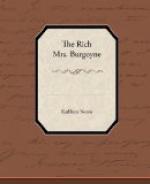Mrs. Apostleman, between being out of breath from hurrying up the hill in the late afternoon heat, and fearful that the gathering would break up before she could say what she wanted to say, and entirely unable to control her gasping and puffing, was a sight at once funny and pitiable. As she sank into a comfortable chair she held up one fat hand to command attention, and with the other laid forcible hold upon Barry Valentine. Three or four of the younger women hurried to her with fans and tea, and in a moment or two she really could manage disconnected words.
“Thanks, me dear. No, no cake. Just a mouthful of tea to—there, that’s better! I was afraid ye’d all be gone—that’ll do, thank ye, Susie! Well,” she set down her tea-cup, “well! I’ve a little piece of news for you all—don’t go, Barry, you’ll be interested in this, and I couldn’t wait to come up and tell ye!” She began to fumble in her bag, and presently produced therefrom her eye-glasses and a letter. The latter she opened with a great crackling of paper.
“This is from me brother, Alexander Wetherall,” said she, with an impressive glance over her glasses. “As ye know, he’s a family lawyer in New York, he has the histories of half the old families in the country pigeon-holed away in those old offices of his. He doesn’t write me very often; his wife does now and then—stupid woman, but nice. However, I wrote him in May, and told him Mrs. Burgoyne had bought the Hall, and just asked him what he knew about her and her people. Here—“marking a certain line with a pudgy, imperative finger, she handed a page of the letter to Barry, “read from there on,” she commanded, “this is what he says.”
Barry took the paper, but hesitated.
“It’s all right!” said the old lady, impatiently, “nobody could say anything that wasn’t good about Sidney Burgoyne.”
Thus reassured, Barry turned obediently to the indicated place.
“‘You ask me about your new neighbor,’” he read, “’I suppose of course you know that she is Paul Frothingham’s only child by his second marriage. Her mother died while she was a baby, and Frothingham took her all over the world with him, wherever he went. She married very young, Colonel John Burgoyne, of the Maryland family, older than she, but a very fine fellow. As a girl and as his wife she had an extraordinary opportunity for social success, she was a great favorite in the diplomatic circle at Washington, and well known in the best London set, and in the European capitals. She seems to be quite a remarkable young woman, but you are all wrong about her money; she is very far from rich. She—’”
Barry stopped short. Mrs. Apostleman cackled delightedly; no one else stirred.
“‘She got very little of Frothingham’s money,’” Barry presently read on, ’"it came to him from his first wife, who was a widow with two daughters when he married her. The money naturally reverted to her girls, Mrs. Fred Senior and Mrs. Spencer Mack, both of this city.’”




